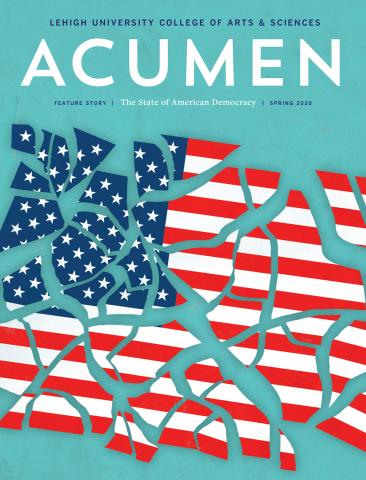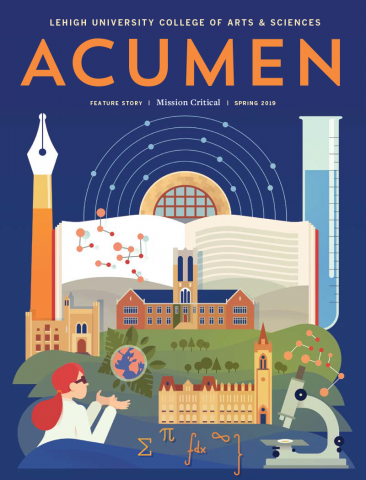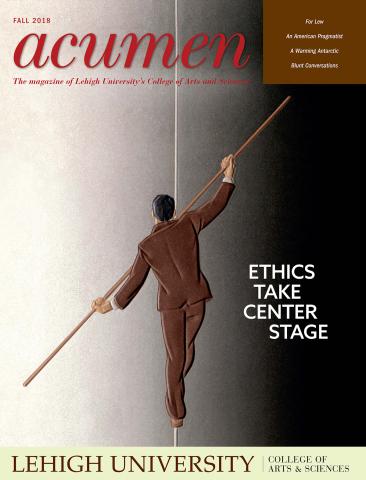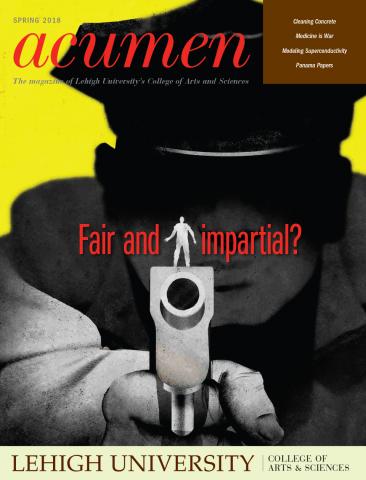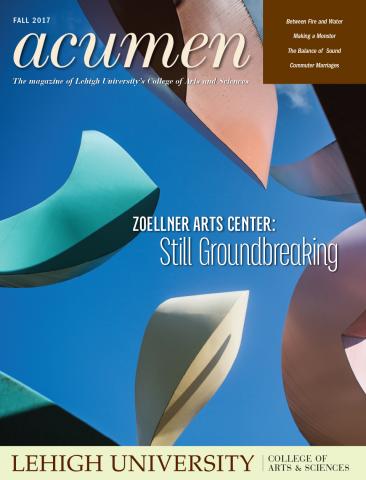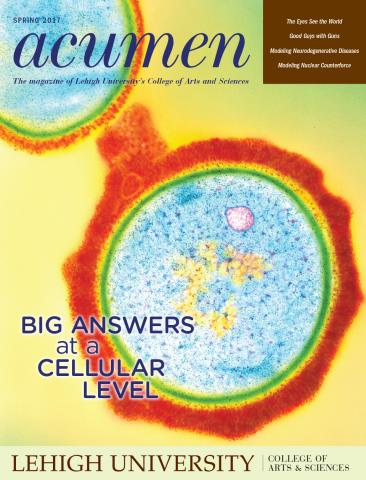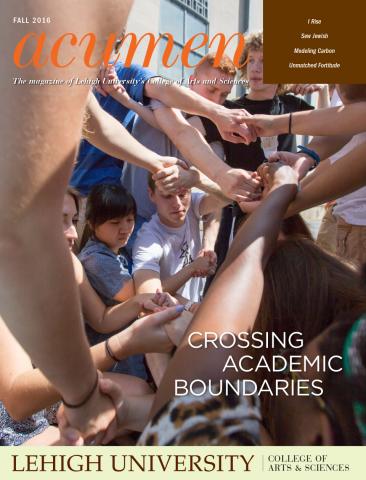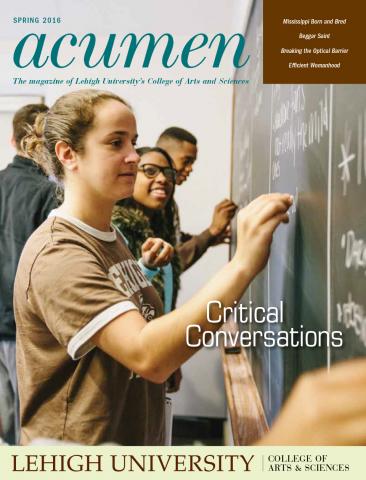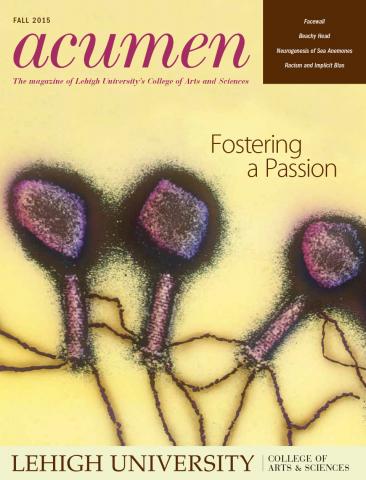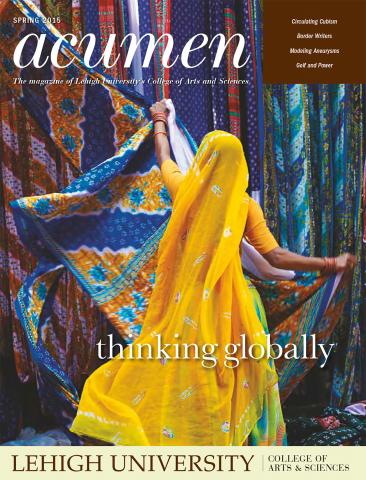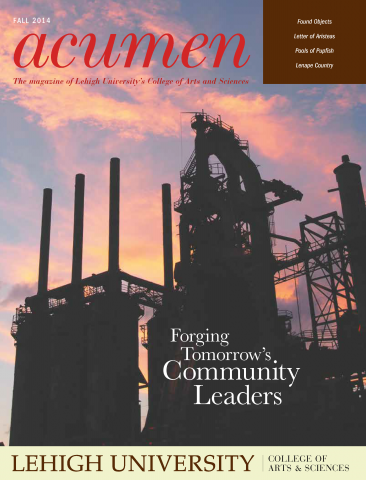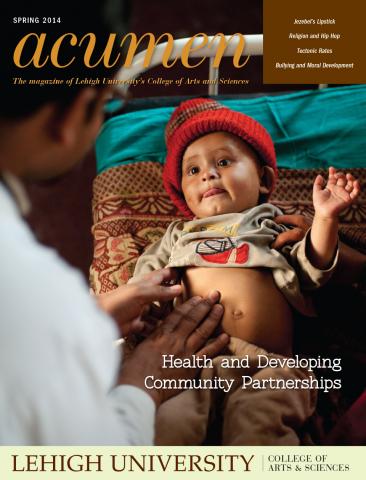
When she entered history professor Steven Cutcliffe’s classroom as a Lehigh undergraduate, Carrie Rich ’07 realized she was in for an unusual learning experience. Not one other student registered for the seminarstyle course. Rich was surprised the course hadn’t been canceled.
Cutcliffe, who was also her adviser and director of the Science, Technology and Society program, took the success of his students seriously; he started the course that semester with a single student. He engaged Rich through lively discussions and readings and even took his teaching out of the classroom into the real world. Another student joined later, but it was still an unusually intense course for Rich.
“We used the Socratic dialogue method to learn, so I had to be on all the time, work really hard, and think and respond on the fly,” recalled Rich. “Professor Cutcliffe challenged me to think differently about what education means and navigated me through thinking creatively, which has served me well professionally. He encouraged me to volunteer in the community. I volunteered at a nonprofit health center, where I learned the meaning of gratitude.”
Rich counts her experiences with this course as significantly formative in her later decision to start the Global Good Fund (GGF). As cofounder and CEO, she created the company in 2012 to accelerate the leadership development of entrepreneurs across the globe using business for social good. Rich connects established business executives with emerging social entrepreneurs to be mentored, scale their companies and ultimately address complex social issues. Underpinned by robust analysis of the global, economical, environmental and social factors that determine individual and societal health, GGF’s philosophy aims to improve lives around the world.
For his part, Cutcliffe was impressed. “She was always prepared for class, [she was] a good discussant and an enthusiastic researcher,” he said. During her senior year, Rich won the Francis Shoemaker Award, given to the STS student who best demonstrates “outstanding academic achievement, qualities of leadership and potential for professional excellence.” Cutcliffe wasn’t the only professor whom Rich counts as most influential. Sociology professor Judith Lasker provided Rich with untapped opportunities for health and human studies learning. “Professor Lasker helped me grow as a thinker. She gave me research that I didn’t know how to do. She had high expectations and expected me to deliver. She planned a field trip to the United Nations in New York, which brought home to me the importance and intricacies of social justice issues. Real world issues,” Rich says.
Art professor Berrisford Boothe inspired Rich as well. “He creates a beautiful world while championing causes that matter, all while surmounting personal hurdles that many people would find insurmountable. He gave me a sense of hope and resiliency—as an entrepreneur, you have to keep getting up,” she said.
Her professors encouraged her to develop her abilities for long-term success. Even as a student, Rich says she felt she was making a difference. She stepped outside her comfort zone and joined the step team, though she was not familiar with the dance form.
“We had an absolute ball. It made me appreciate what it was like to be a minority,” she said. This understanding informs Rich’s work with the GGF, as many of the people it helps are living as racial, ethnic or economic minorities. Her experiences in Leadership Lehigh were also transformative, as was her service as a residential assistant. “Each opportunity taught me about leadership. I learned how to nurture other people, not just myself,” she says.
After Lehigh, Rich entered graduate school at Georgetown University in Washington, D.C., to study health systems administration. While at Georgetown, she began working for Perkins+Will, an architecture and design firm, and interned with Inova Health System, a leading health organization in the D.C. region. Her work included mopping floors and folding baby laundry. She seized this opportunity to build her network.
“Sometimes opportunities are masked as hard work,” Rich says. Her chance came when she was assigned to take attendance for a meeting that Knox Singleton, Inova’s CEO, would join. She knew Singleton had grown Inova from one small hospital to a multi-billiondollar organization—all while volunteering in Haiti for more than 25 years. Rich surmised that he cared about making the world a better place. “I wondered why the CEO of a big company would want to speak with me, an intern. I figured Mr. Singleton cared about legacy, so I asked his assistant for a meeting on that topic—a topic different from what I imagined he normally talks about. I got dressed up in formal business attire and attempted to be as professional as possible. I was so enthralled by our initial meeting that I blurted out, ‘Would you write a book with me?’”
To Rich’s surprise, Singleton replied, “Yes,” and asked her what they should write about.
Soon, it emerged that both individuals were interested in the principle of sustainability to make health care more effective. Rich helped structure Singleton’s thinking on the subject along with another co-author. Sustainability for Healthcare Management is to have a second edition, with Rich as one of the three co-authors.
In the meantime, Rich continued working at Perkins+Will, where she was a health care specialist. She also taught as an adjunct faculty member at Georgetown University, where she developed a Healthcare Sustainability program curriculum. One day, Singleton offered Rich a job as senior director of vision translation at Inova.
“What a dream! My job was to craft a vision for the future of health for two million Inova patients and its 16,000 employees. Once we’d crafted a vision, my job became communicating that vision. He gave me responsibility for communications and brand. He challenged me to think big, sponsored, coached and pulled me up. Mr. Singleton empowered me.” Soon, Rich was dreaming even bigger.
“I started thinking, what if we could find young people throughout the world who have a strong work ethic and care about making the world a better place but lack experience? We could pair these emerging leaders with experienced business leaders and put targeted financial capital behind the pair—what a catalyst for good that dynamic would be.”
Her concept began forming on her 26th birthday. Singleton gave her $100, saying that instead of taking her to lunch for her birthday, she should use it for her idea. Rich approached six organizations she knew and asked each to submit a proposal for what they would do with 10 times the amount of her birthday gift if it had a sustainable social impact. Inspired by their responses, Rich wrote to her friends and family for donations, with the subject heading, “The Global Good Fund.” She beat her $6,000 goal, raising $6,052. Two weeks later, Rich received an email from someone who said they’d met at a conference and offered a $1 million anonymous contribution.
“Now I didn’t know what to do. I went to [Singleton], and he ended up matching the gift,” she said. In three months, Rich had $2 million start-up capital for her dream of funding global good.
Though Rich loved her job, Singleton encouraged her to go beyond what felt comfortable. He supported building a board of directors and advisers that could get the GGF started. The board asked her to lead the organization.
“Today, we have a small staff, and we have supported 38 social entrepreneurs to date. Half are domestic. Half are nonprofits with sustainable revenue streams. More than half of the entrepreneurs we support are women, which is important to me,” she says.
GGF has indirectly helped create 100,000 jobs in some of the most underserved communities around the world. Recently, the company opened an office in Colombia, in addition to its offices in Washington, D.C., and New York City. More than 100 seasoned and socially minded executives mentor emerging social entrepreneurs globally.
“People are looking for structured, meaningful ways to translate their business success into social significance. We’re exclusively focused on growing the leadership capacity of social entrepreneurs who are at a critical inflection point, a point at which their leadership will influence whether they will have sustainable social impact,” Rich explained.
Rich also teaches at George Washington University and the Amani Institute in Kenya and writes for media outlets, including Forbes, Entrepreneur and Huffington Post. She sits on the boards of several companies and organizations and has been lauded for her achievements. She received the EY Entrepreneur of the Year award, POLITICO Women Who Rule award, Washington Business Journal 40 under 40, Entrepreneur.com Top 30 Start-ups to Watch, Stevie Award for Women in Business, Asian Social Innovation CEO of the Year, Social Enterprise Alliance 50 under 40 and Empact100.
When a new challenge enters her life, Rich thinks of the children’s story Harold and the Purple Crayon. Harold draws what doesn’t exist. “It helps me remember that there is always an opportunity to design something great if it adds value and makes a difference in the world,” she said.























